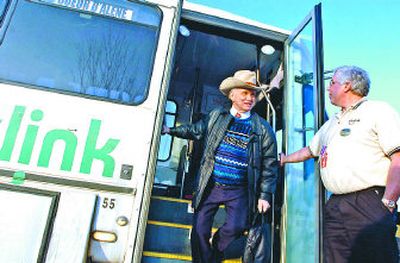Bill sets Dec. 1 gas tax deadline

BOISE – A House committee moved forward Friday with legislation that would allow the state to begin levying its gas tax on fuel sold on three Indian reservations, if an agreement between the governor and tribes isn’t reached by Dec. 1.
The House Transportation and Defense Committee voted 9-2 to amend House Bill 249 setting a firm deadline, or the state will begin imposing its gas tax on fuel distributors that supply the tribes.
Lawmakers made the decision exactly a year after giving tribes one year to complete negotiations – a point not lost on opponents of the tribe’s exemption from the 25 cents-per-gallon state gas tax.
Supporters of the Republican leadership-backed bill said the tribes have had ample time to bargain and should help support building and maintaining Idaho’s roads by paying the state tax.
But Coeur d’Alene and Nez Perce tribal representatives said negotiations are their sovereign right, and they already contribute money from self-imposed gas taxes to those needs.
The Coeur d’Alene Tribe contributed nearly $1.4 million to help start the free Citylink bus system in Kootenai County, for example, said Bill Roden, lobbyist for the tribe.
“They use their money wisely. But they’re willing to use it in cooperation and give to the communities that they serve, not only the tribal members but the non-tribal members,” Roden said.
Coeur d’Alene Tribe chairman Chief Allan said the tribe has been in negotiations since January.
“This gives us the room to get it done,” Allan said.
Rep. Scott Bedke, R-Oakley, a co-sponsor of the bill, said he is “fully confident” a deal will be hammered out by the deadline.
David Kerrick, a lobbyist for the Nez Perce, said the bill is “marching orders to the Tax Commission to go to court.”
The legislation would deprive the tribe of its only source of tax revenue, which it uses to pay for infrastructure projects and social services, he said.
“We’re disappointed to see this effort to return to court,” he said, noting that tribes have dealt with three governors during the last year.
Rep. JoAn Wood, R-Rigby and another co-sponsor, said not enforcing the gas tax on tribal fuel will cost the state’s highway fund $3.3 million in 2007, even if the bill passes.
“We are not taxing the tribe,” Wood said. “The money will be paid by the distributor.”
The state has lost out on more than $10 million in potential taxes between 2003 and 2006 based on Tax Commission data, said Suzanne Budge Schaefer, executive director of the Idaho Petroleum Marketers and Convenience Store Association.
“A time needs to come where this gets brought to a close,” she said.
But Rep. James Ruchti, D-Pocatello, a labor attorney, said the Dec. 1 timeline would never fly with corporate negotiations.
“To me it just feels that the tribes have a gun to their head,” he said.
Several petroleum distributors testified in favor of the bill, saying some tribes’ fuel prices are unfair competition. Coeur d’Alene and Nez Perce tribal representatives, however, said their prices are equal to or higher than those at off-reservation stations because of self-imposed taxes.
In 2006, the Coeur d’Alene and Nez Perce tribes combined sold the same amount of fuel as the Shoshone-Bannock Tribes of southeastern Idaho – about 6 million gallons.
Francis SiJohn, Coeur d’Alene tribal vice chairman, said his tribe charges its own 25 cent gas tax that helps to pay for transportation needs. That tax source is “near and dear,” he said.
“It’s like we’ve got one foot, and we’re standing on it and trying to balance,” he said.
While the tribe does get Bureau of Indian Affairs funding to help with roads, it has close to 600 roads within its boundaries, he said.
The bill is scheduled to come before the House for amendment Monday.